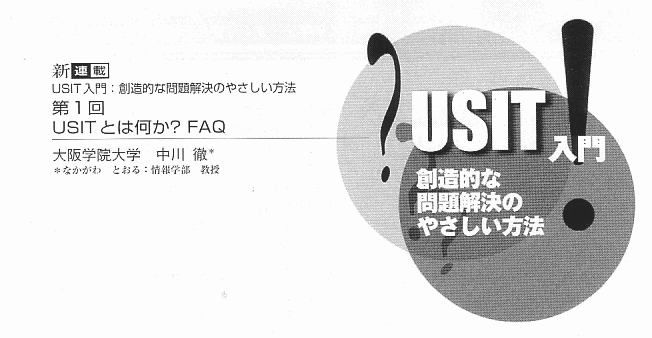Editor's Note (Toru Nakagawa, Jul. 21, 2007)
In the Japanese page, I have started to post my series of lectures on "Introduction to USIT: A Simple Method for Creative Problem Solving". The series has just started to be published in the August Issue of the monthly journal "Machine Design", which is published by Nikkan Kogyo Shinbun Co. The series is scheduled to publish 5 lectures until the December Issue of this year. Under the permission of the Publisher, I am going to post the lectures here in the HTML format. Many hyperlinks have been inserted in the HTML page for your reference. (PDF version will not be posted.)
As you might know, I started another series of lectures since January Issue of the last year with the title of "TRIZ: Creative Problem Solving Methodology for Innovation". This series is published in another monthly journal "InterLab", published by Optronics Co. I have written 20 lectures already and am still going to write some more (years!). In the TRIZ series I have included a number of research trends in TRIZ in the world and introduced them to people after my own understanding and evaluation. Thus in the TRIZ series I have mentioned many times on USIT which I have been promoting myself, but still USIT is mentioned only from time to time as just a part of TRIZ.
So, in the present series on USIT, I am going to introduce you to USIT in a compact and consistent form. The outline will be as follows in 5 parts:
Part 1. What is USIT? FAQ Aug. 2007
Part 2. Simple Case Studies of USIT Sept. 2007
Part 3.
Problem Definition and Analysis with USIT Oct. 2007
Paet 4. Creative Solution Generation with USIT Nov. 2007
Part 5. Practices of USIT Dec. 2007
Here shows the title part of Part 1.

English translation is not planned at moment, because of the lack of my time.
The tables of contents are summarized in the following.
| Part |
Published in |
Theme |
Contents |
HP Posted |
| 1 |
Aug. 2007, pp.56-63 |
What is USIT? FAQ |
(1) Introduction;
(2) What is USIT? Its History of Development;
(3) Information Sources and Textbooks of USIT;
(4) Motive and Features of USIT;
(5) Process of Problem Solving with USIT;
(6) Practices in USIT;
(7) Penetration Status and Significance of USIT |
Jul. 22, 2007  |
| 2 |
Sept. 2007, pp. 92-98
|
Simple Case Studies of USIT |
(1) Overall structure of problem solving with USIT.
(2) How to prevent the staple from being crashed [Problem definition; Problem analysis; A new understanding of the problem; The idea for a new system; Generating the solution concept with Smart Little People's Modeling; Constructing a solution];
(3) How to fix a string shorter than the needle [Problem definition, Analysis of time characteristics and space characteristics; Analysis of functions; Analysis of attributes (or properties of components); Various known solutions; Building an image of ideal system; Generating solution ideas; A novel tool made of a straw; A novel needle specialized for making a knot; Remarks on the idea generation stage of this case]
|
Aug. 17, 2007   |
| 3 |
Oct. 2007, pp. 92-98 |
Problem Definition and Analysis with USIT |
(1) Overview of the Problem Definition and Problem Analysis [Problem definition and problem analysis; Concepts of Objects-Attributes-Functions];
(2) How to Define the Problem [Well-defined problem in USIT; Remarks on the problem definition phase];
(3) Problem Analsyis: Understanding the Present System [Analysis of space characteristics; Analysis of time characteristics; Understanding the functional relationships in the present system; Understanding the attributes involved in the problem of the present system];
(4) Problem Analysis: Understanding the Ideal System [Significance of considering the ideal system in the problem analysis phase; To imagine the ideal results; Magical Particles (Smart Little People); Application example of the Particles Method] |
Oct. 15, 2007   |
| 4 |
Nov. 2007 |
Creative Solution Generation with USIT |
(1) Outline of the Solution Generation Stages in the Six-Box Scheme in USIT [Notes on the representation with data-flow diagram; The meaning of 'Ideas for the new system'; The Idea generation phase in USIT; The Solution construction phase in USIT; The Solution implementation phase];
(2) The USIT Operators [Establishing the USIT Operators; Overview of the USIT Opertors; Examples and usage of USIT Operators; Thinking procedure and guidelines of USIT Operators];
(3) Guided thinking in the Solution Generation Phases [Ways of thinking with the images of ideals; Solving contradictions and USIT Solution Combination Methods; Hierarchical system of solution] |
Nov. 1 , 2007   |
| 5 |
Dec. 2007 |
Practices of USIT |
(1) For what purposes can we use USIT?
(2) How can we learn it?
(3) Trainings of USIT [Bringing in real problems and solving them by multi-company engineers; Agenda of 2-Day USIT Training Seminar];
(4) Keypoints foe mastering USIT [Problem finding and probem definition phase; Problem analysis phase; Phases of idea generation and solution construction; Solution imlementation phase; The roles of TRIZ in the USIT procedure]
(5) Practices and promotion of USIT [How to penetrate, apply, and fix USIT in organizatons; Applicaton activities of USIT; Practice method of solving real problems in a short period]
(6) Case studies of promoting TRIZ/USIT
(7) Concluding remarks |
Dec. 9 , 2007   |
buttons..